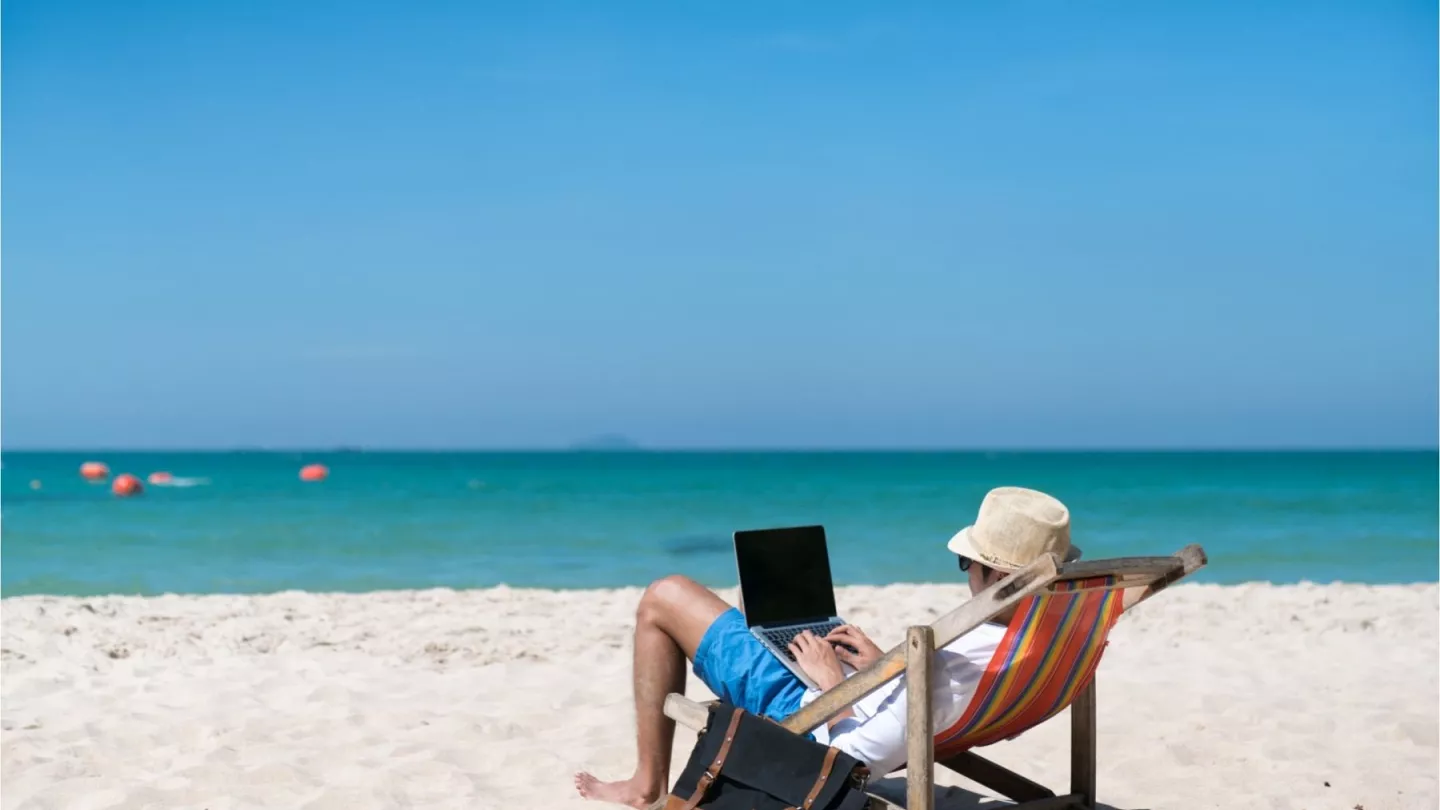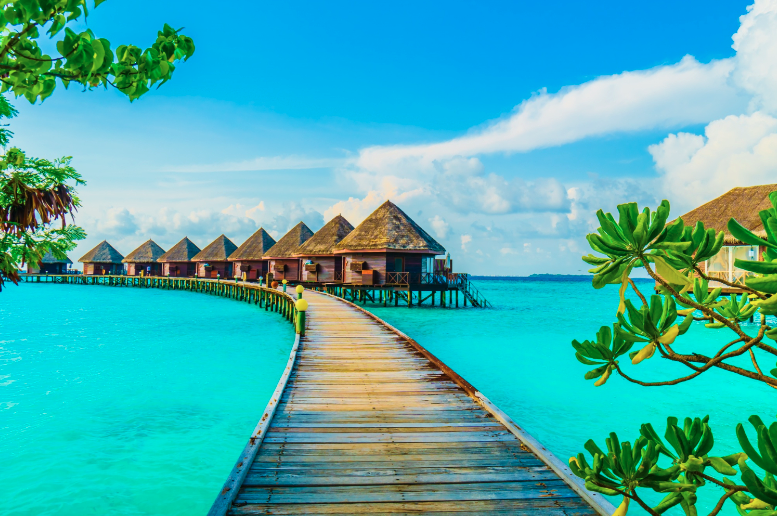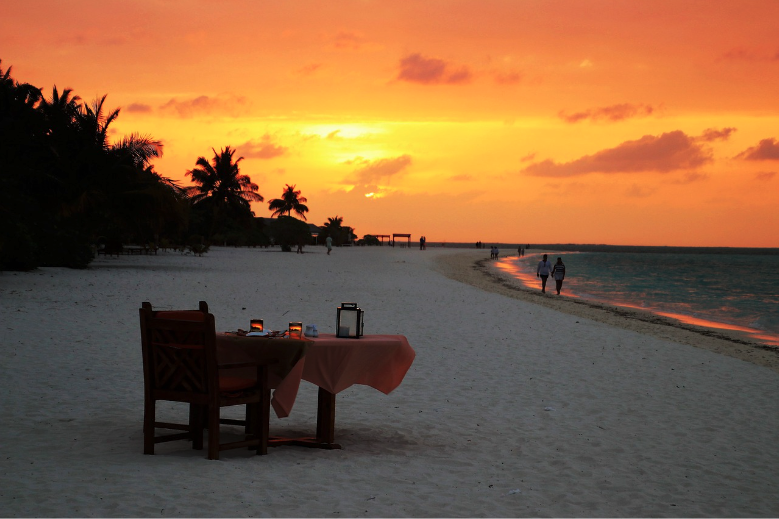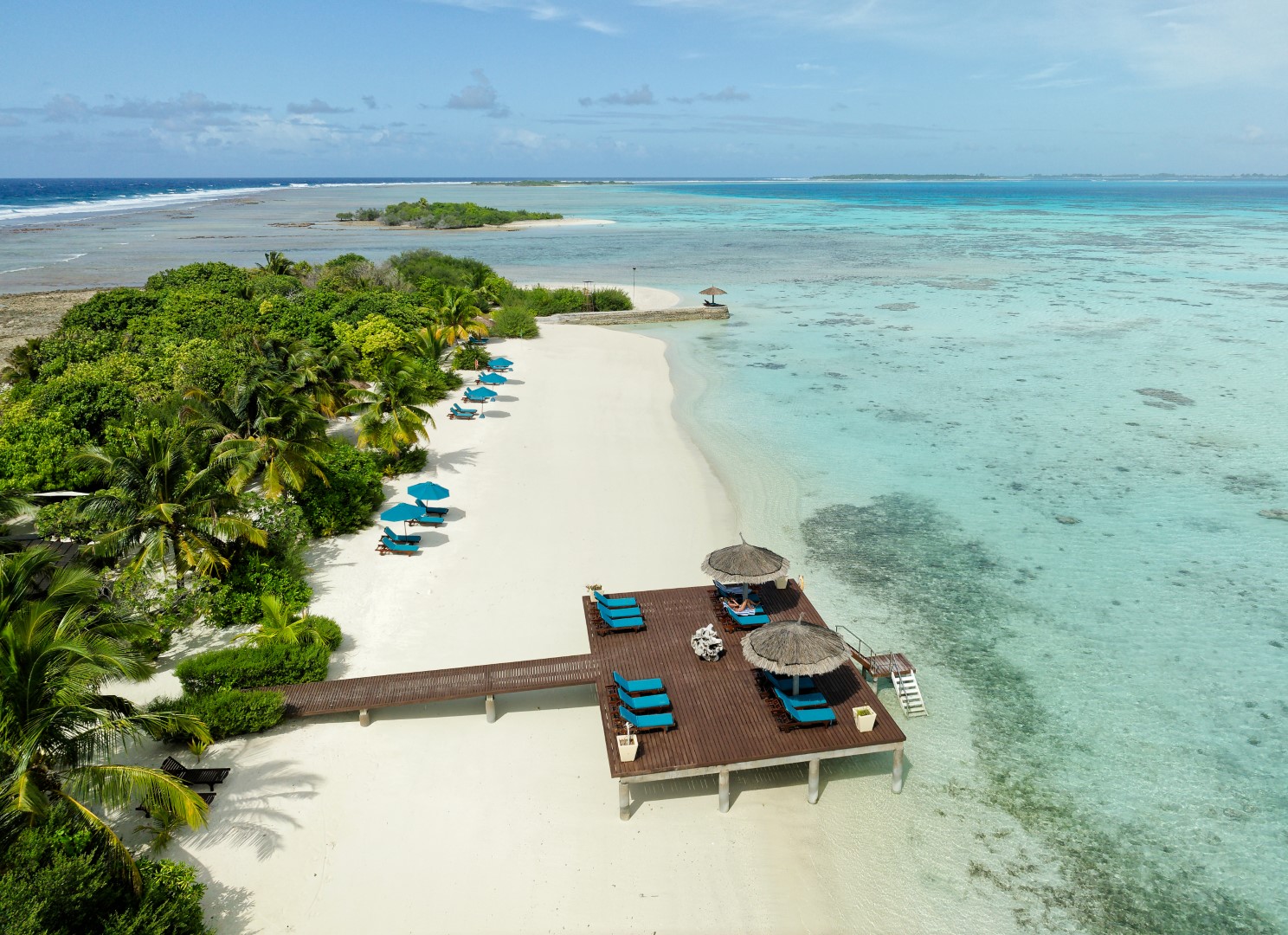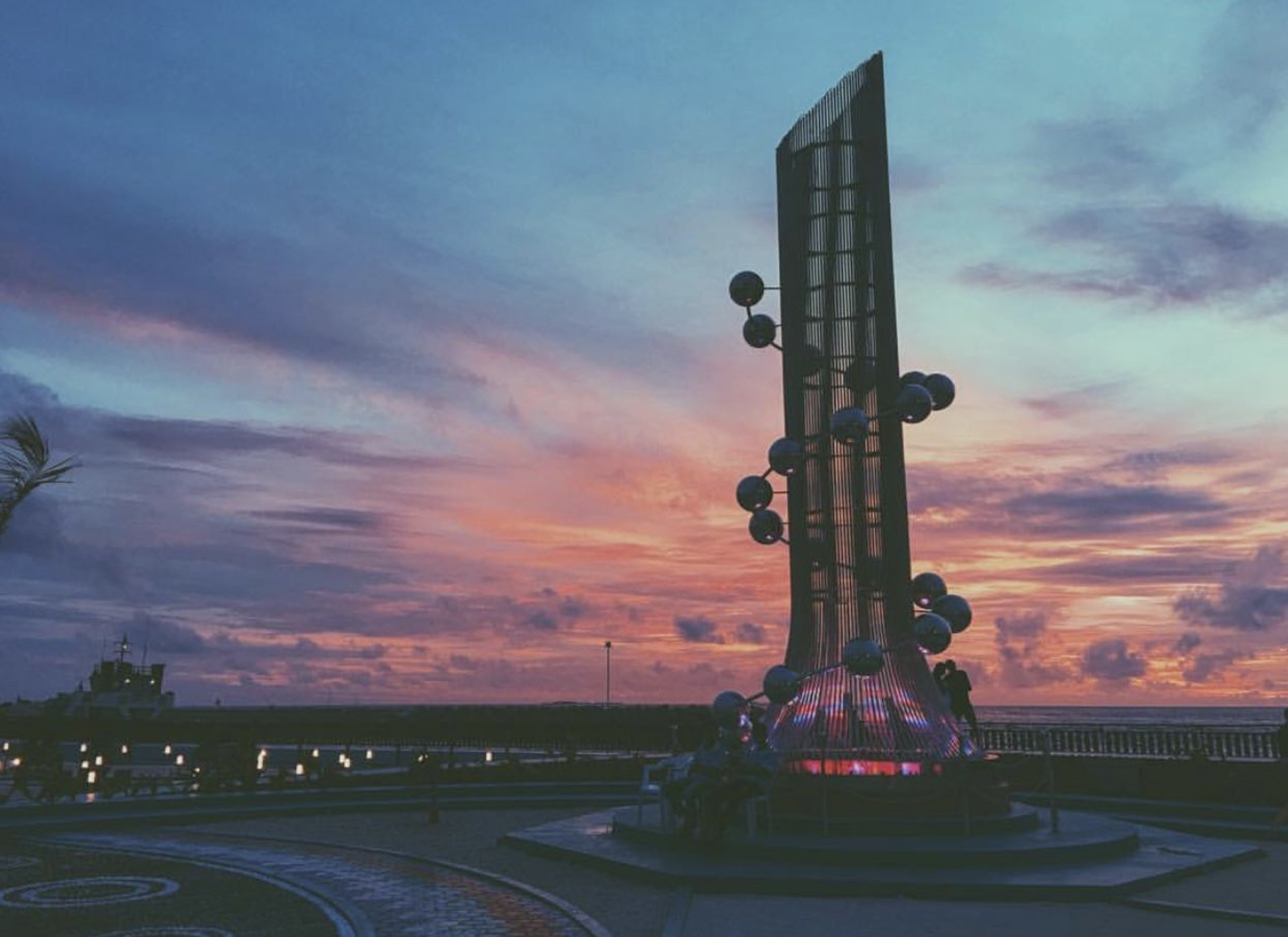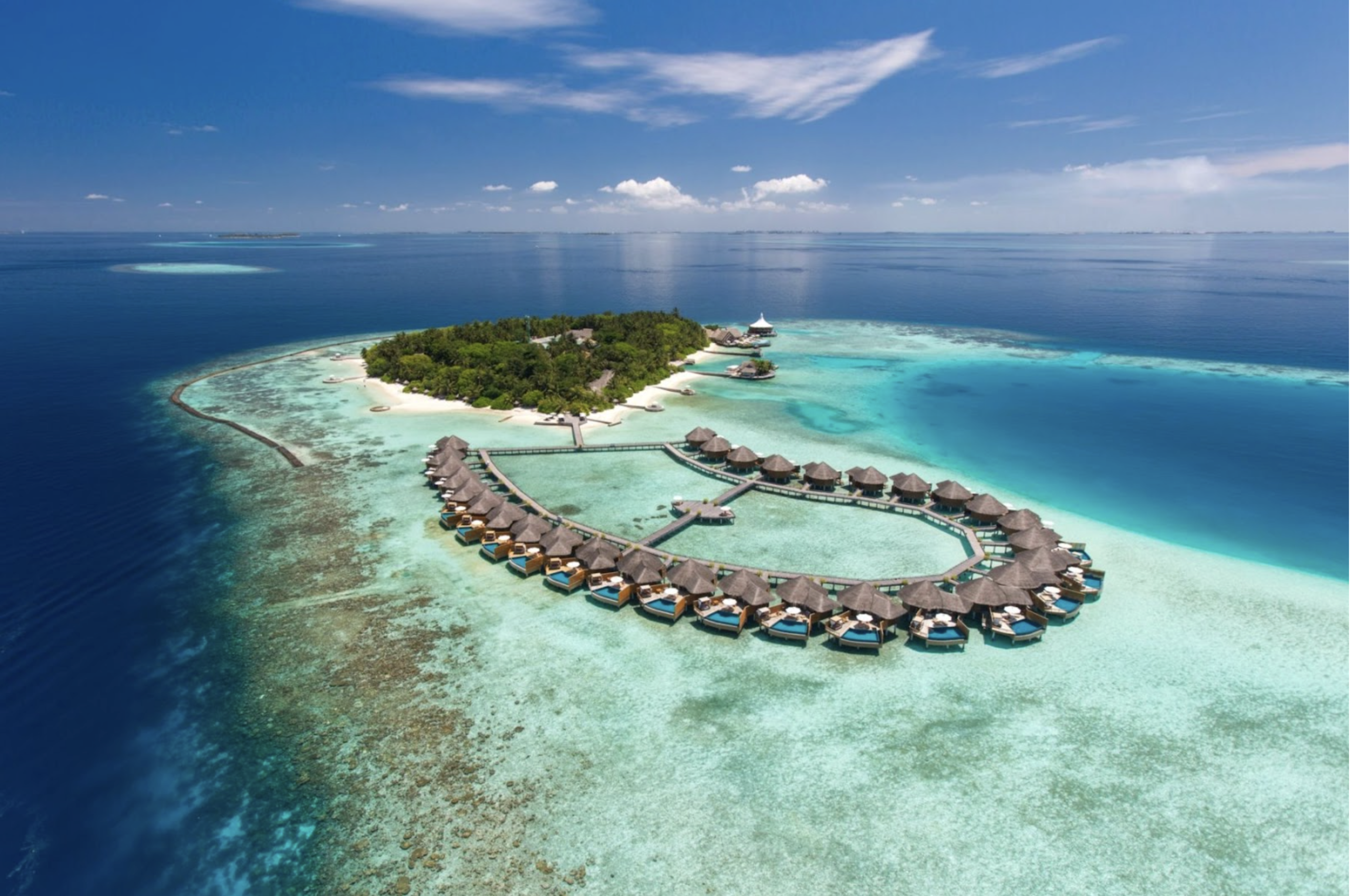Digital Nomad’s Paradise: The Maldives for Digital Nomads
With international travel back on the menu, becoming a digital nomad in Maldives has become easier than ever. Digital nomadism is a lifestyle that’s become increasingly popular in the last few years. With the COVID-19 pandemic in 2019 and the economic crisis in 2020, people have had to work remotely due to lockdowns and to cut costs during such a state in the world. This led to an upsurge in digital nomadism, where the ability to work remotely in any part of the world was seen as a net positive.
With the advent of the internet, cheap wifi, technological leaps such as laptops and smartphones, digital nomadism has never been in a better spot. Imagine opening up your laptop or tablet and cleaning up a project while on a sunbed by the beach. With the sound of waves lapping on the beach and ocean breeze blowing your way, finishing your work as relaxed as can be.
Overview of Digital Nomadism
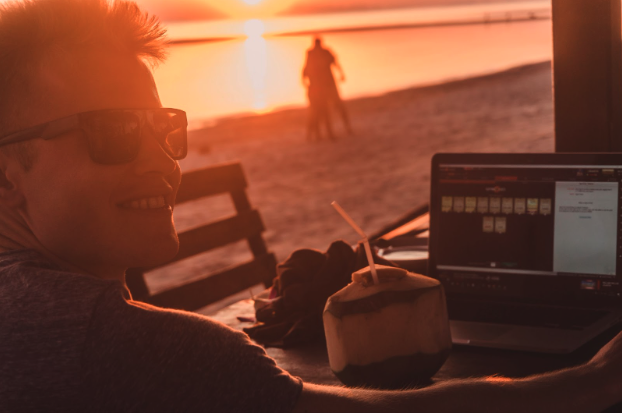
Digital nomadism is the practice of undergoing employment no matter where you are on the planet. If you can complete your work over the internet for a client that’s in a totally different country from you as you travel from place to place, you’re a digital nomad. As mentioned earlier, the advent of the internet and the advancements in technology allow people to travel the world while still holding down a job.
If you pick your place of residence with consideration, you may find yourself spending much less than what you’re earning, making for a profitable lifestyle. This takes a bit of maths and research skill to pull off but once you find a place where you can live sustainably as your work, you’re already off to a great start. The freedom it gives you can be amazing and is one of the reasons people gravitate towards digital nomadism.
So much flexibility is available, with you being able to choose your work hours, start a hobby or two and basically live your life as you see fit, is quite a huge plus point. You can finish up your professional queries and head out to experience this new country you’re in, try new food, meet interesting people and so on.
Why Choose the Maldives as a Digital Nomad Destination
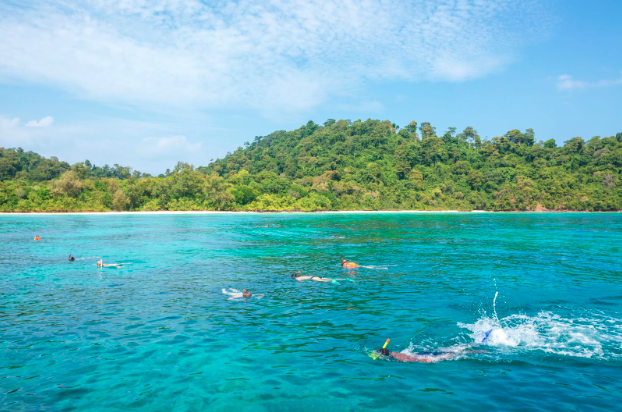
Maldives is known to be a travellers’ goldmine, with its aesthetic beauty outshining all its other tourism and hospitality facets. Cooling islands covered in foliage, fine sandy beaches and cerulean waters that stretch beyond the horizon. A life where you pull up your laptop, sit on the beachfront porch and get your work done is nothing short of relaxing and inspiring.
Since the islands are small, there’s one thing you can expect in abundance: tranquillity. A city life is usually littered with tons of background noise such as construction, vehicles and the like. On an island at the beach, the only thing you’ll be hearing are the waves lapping on the shore. The lack of background noise is enough to send you into a deep focus where you power through your professional obligations as fast as can be.
Practical Considerations for Digital Nomads in the Maldives
One of things that you have to prioritise before you even start packing are the visa requirements for a digital nomad in Maldives. Sadly, visas for digital nomads aren’t a thing in Maldives, yet. Hope is not lost however, as there are still two options that you can explore.
1. Business Visa
Out of the two options, a business visa is the more complicated, time-consuming and costly to obtain. Firstly, you need to have lined up an employer or a local sponsor in Maldives as they are the ones who will be able to give you a work permit along with an invitation letter to enter the country as a worker. This will also allow you to conduct business activities and gainful employment as you’re doing your nomad work.
You also have the opportunity to open a local bank account, allowing for easier transactions and perhaps move funds between your Maldivian and other accounts. For the visa to be viable you need not have a confirmed return ticket nor do you need any sort of set accommodation prior to arrival. Renewing this visa can be costly and time consuming as well.
2. Tourist Visa
This visa is the easiest to get, as you get it automatically upon entering Maldives. It lasts 30 days, with a $50 fee netting you an extra 60 days. You can do your work while under this visa but you can’t get involved with local businesses or employment opportunities.
In order for you to get this visa, you’ll also need a confirmed return ticket and proof of accommodation. You won’t be able to open a local bank account either so transferring funds is a no go. Due to this, you’d have limited cash on you and you’d have had to bring enough to last the trip.
Maldives hasn’t implemented an actual digital nomad visa but the government has expressed an interest in doing so, so it might not be too long until digital nomads get a visa that’ll make their stay in Maldives that much easier.
Another thing that you might want to consider is the wifi. Maldives doesn’t have the best internet connections and it can get somewhat slow within the islands as well. A slower internet connection could have impacts on your workflow as a whole, with decreases in productivity and motivation. There are decent internet connections but that’s mostly at the capital Male’, Hulhumale’, a few other islands and resorts. Having a mobile hotspot or two as backups would do you wonders as well if you run into any issues. A VPS would do wonders as well, along with some two-factor authentication for your accounts for some added security.
Maldives is quite a small country, made of many scattered islands across a great distance. These islands aren’t that big either, with the biggest island being Gan Island coming in at 7.8 km. And while the country is known for its amazing underwater sights and island adventures, there’s not much to do in this country apart from the aforementioned. A lot of the islands also don’t have some important amenities such as full-fledged hospitals (there are doctors and clinics but nothing that’ll help with anything major) or major bank facilities (there are ATMs only in some of the inner islands, not all). So if you’re thinking about staying at one of the islands, these are things you’ll need to consider.
One of the best ways to find accommodation in Male’ and Hulhumale’ is by using free online classifieds which are on iBay. People upload pictures, specs and amenities of apartments and homes along with a price tag and contact details. The downside is that Male’ and Hulhumale’ tend to have pretty high rent rates so it might be easier on your wallet if you stay at one of the neighbouring islands.
Best Islands and Atolls for Digital Nomads
While Maldives may have some island destinations that would intrigue you, some of them really aren’t the best for digital nomads. Here are some of the best islands (in no particular order) you can stay at while living out your dream.
1. Male’
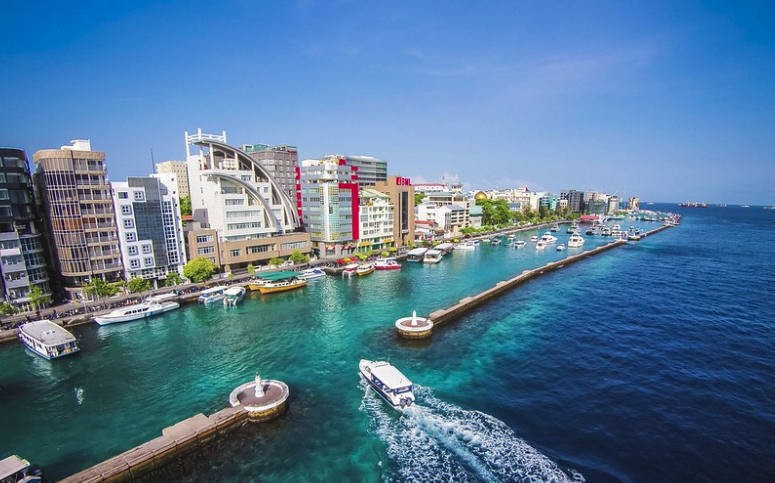
Male’ is the capital of Maldives and the most developed island, meaning it would have the most available and important amenities such as hospitals, banks, etc. The island is also highly populated, both in terms of people and infrastructure, making it a prime social hub. Male’ is also the beholder of Maldivian culture, with a dedicated museum and landmarks that shows the rich history of the island nation.
Food, entertainment and company are abundant in the capital, allowing for people to live and thrive socially and professionally. The island is also the closest to Velana International Airport, making it easy to travel internationally and domestically. One thing to be aware of however is the high cost of living here. Rent is quite high, along with prices for groceries and other basic needs. Inflation can be attributed to this but the capital is on the higher end of the spectrum due to its crowded nature.
2. Hulhumale’
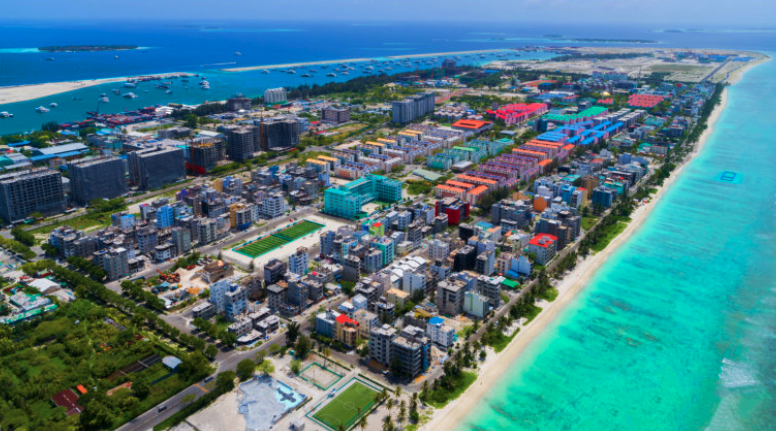
Hulhumale’ is located close to the capital and is a man-made island which has been in development since 1997. Hulhumale’ serves as both an international airport and as a place to live for those that want to move closer to the capital. It is spacious, green-minded and filled with top-of-the-line amenities. The city was designed with quality infrastructure, with buildings being made with environmental and social factors in mind.
The rent here is a bit lower, the apartments are a bit bigger, basically it’s Male’ 2.0, with upgrades in almost every fashion. There’s also a bridge connecting Hulhumale’ to the capital so that land vehicles have become a transportation option without having to solely rely on water-based vehicles.
3. Thulusdhoo
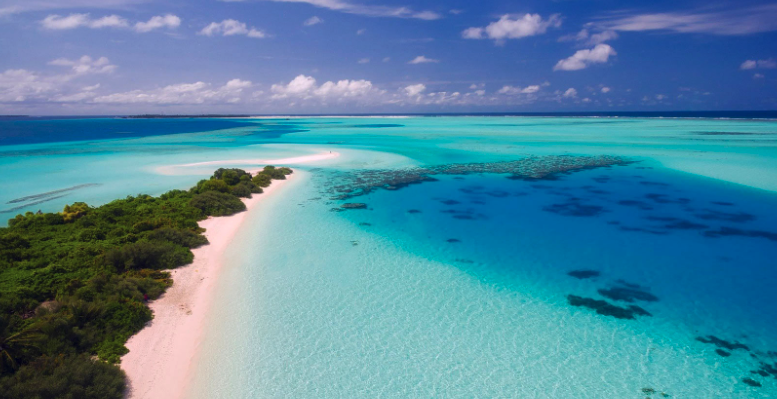
Thulusdhoo is situated 23 km from the Male’ and Velana International Airport, with the trip being an hour-long ferry ride along with daily trips:
- Scheduled Speedboat (25 minute ride, $35 per person each way)
- Velana International Airport to Thulusdhoo
- 11:00am, 5:00pm, 10:00pm Saturdays thru Thursday
- 9:00pm, 5:00pm, 10:00pm Fridays
- Thulusdhoo to Velana International Airport
- 8:00am, 2:30pm, 6:00pm Saturdays thru Thursday
- 7:30am, 2:30pm, 6:00pm Fridays
- Velana International Airport to Thulusdhoo
- Local Ferry
- Male’ (Villingili Terminal) to Thulusdhoo
- 2:30pm daily except Fridays
- Thulusdhoo to Male’ (Villingili Terminal)
- 7:30pm daily except Fridays
- Male’ (Villingili Terminal) to Thulusdhoo
The island has about 20 or so guesthouses / hotels making it easy to lock down your accommodation. There’s also a small clinic that’ll help you with small injuries and emergency situations and an ATM via Bank of Maldives if you ever need to take some money out. The island has a few small restaurants too that
The island is famous for its accessibility to some legendary surf spots so if you’re a surf enthusiast, Thulusdhoo is the place to be. Here are the surfing spots in question:
- Chickens
- Cokes
- Ninjas
- Sultans
- Honky’s
The island also has some amazing sandbanks and snorkelling spots for underwater enthusiasts:
- Sandbanks
- Asdu Sand Bank
- Chikana Sand Bank
- Infinity Sand Bank
- Snorkelling spots (turtles, sharks, manta rays, etc)
- Coral Garden
- Shark Point
If you’re a water enthusiast by any means, you’re going to have a great time at Thulusdhoo and make a decent amount of friends through the sharing of your passions.
Co-working Spaces and Remote Work Facilities in Maldives
Maldives has a total of two official coworking spaces, one at the capital and one at a resort. SEED by BCC is a coworking space located at Male’ and is quite state-of-the-art. They have high speed internet, security, storage, food, drink and more to sustain a solo or shared venture. It’s the first coworking space to open in Male’ in 2021 and has become a popular hub for entrepreneurs to gather and further their careers and dreams.
The second space is located at JEN Maldives by Shangri-La known as JEN Society. It doubles as a coworking space and gym and comes with lots of members benefits, including 24/7 coworking spaces, 24/7 JEN Active gym access, access to member exclusive events and more.
Balancing Work and Leisure in the Maldives

Living as a digital nomad in Maldives nets you one of the best perks of being a working adult: dictating your own work-life balance. Since you can work anywhere, it stands to reason that you can work at any time. So you get to decide when you start working and when you stop working. Combine this with the increase in leisure time and decrease in work time (considering if you complete your work as per deadlines), you get a decent amount of time to yourself.
Maldives has some fascinating activities you can partake in, even though there’s not an abundance in the type of activities due to the smaller geography of the country and islands. Things like snorkelling, diving, excursions, fishing, anything related to the sea is available for you to enjoy. Maldives even has skydiving available at Ifuru Island Maldives, a 5 Star resort at Raa Atoll. In the capital and Hulhumale’, there are lots of other activities to indulge in, such as karaoke, a VR gaming studio, 8-ball pool venues and more.
As long as you complete your work within your working hours and separate work from your relaxation times, you’ll do just fine as a digital nomad.
Networking and Community Building
Being a digital nomad can sometimes be a lonely endeavour. Staying alone in a new country would have that effect unless you’re travelling with a partner or have some friends in the country from prior trips. It’s important to network and throw yourself into social circles concerning your career and hobbies to maintain a healthy mental state. There’s a lot of events spanning multiple industries that take place in Maldives such as:
- Engineering and Technology Conferences
- International Conference on Medical, Medicine and Health Sciences (ICMMH)
- International Conference on Business, Commerce and Management Studies (ICBCMS)
- World Conference on Soil, Water, Energy and Air (EUWCSWEA)
There’s much more conferences to be explored, which can be browsed by clicking here or here.
That’s more so for the professional aspect of networking. If you want to connect with people outside of work reasons, Male’ (and mostly the major islands of Maldives) has a decent amount of expats, making it a decent spot for building connections. Expats have their own communities and are quite welcoming and accommodating, making the challenge of getting some new friends a breeze.
Cultural Immersion and Experiences in Maldives

Maldives has an incredibly rich culture that’s still celebrated and kept alive to this day. Through the years, the exposure of certain cultural aspects such as clothing and practices have been in use more for celebratory purposes such as parties or welcoming world leaders such as the Boduberu performance and traditional garb such as the Dhivehi Libaas and Mundu.
Male’ is home to the National Museum where relics from Maldives’ past are proudly shown on display. Boduberu is seen quite frequently for birthdays, end of Ramadan, Independence Day and so on. In the inner islands, there are people who still wear the traditional clothing, build old-timey boats by hand, weave mats and so much more. Even traditional food still has its place in Maldives. No matter where you are, you can easily experience true Maldivian cuisine at restaurants or even at a friend’s house. Culture and tradition is best experienced by staying at any of the inner islands.
There’s even some sports activities and games you can take part in that go back to Maldives’ golden days. Activities such as Bashi, Baibalaa and Ohvalhu Gondi are still quite popular, along with many more activities for you to indulge in.
Challenges and Solutions for Digital Nomads in the Maldives
Some of the challenges people would face would be immigration and visa issues, healthcare issues, wifi, accommodation and banking as mentioned earlier.
There are some other things you need to be aware of as well. One of them is the stability of your cash flow. If you’re a digital nomad, you’re most likely freelancing to earn money. Being on a contract basis can at times present problems if you end up not getting some work for too long. One of the best ways to circumnavigate that is to try and tackle more than one contract so that you can increase your income. Just make sure you don’t overload yourself and you should be all good.
Another thing you can do is to get really good at budgeting. Buying the things that you really need when the time calls for it and splurging when you can will help you in the long run. You can also try looking into some ways you can get passive income. This might take a while to get up and running but once it’s done, a huge weight just lifts off your shoulders.
Maldives is an excellent digital nomad destination but it’s not without its hurdles. While it may seem like a massive undertaking, a bit of research, understanding and planning will have you living your dream in no time. Relaxing on the beach and working your butt off while enjoying island life is achievable in this day and age. We at MadlyMaldives hope this guide helps you on your journey!

